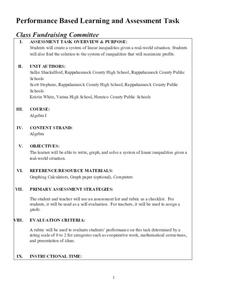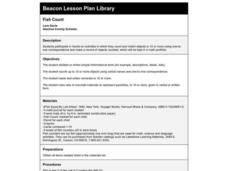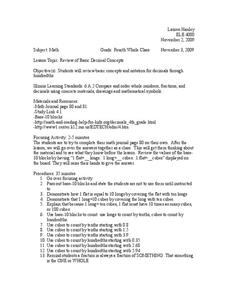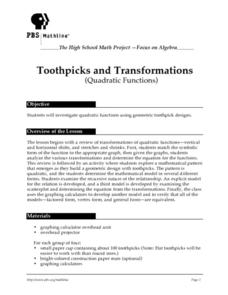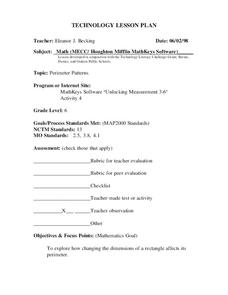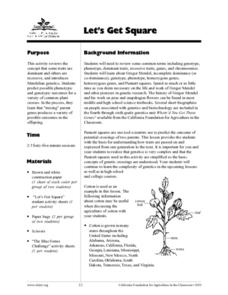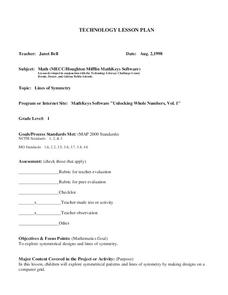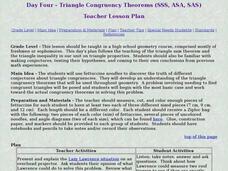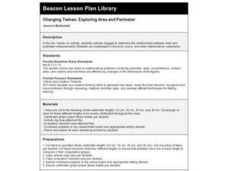Curated OER
Celebrating the Universal Language of Numbers
Math games and activities spark the imagination while building crucial skills.
101 Questions
Ants Marching
Your classroom will be rockin' during an toe-tapping lesson! Dave Matthews inspires a lesson on proportions as youth listen to a song and predict its length. Lesson materials provide learners with ordered pairs that mark the time slider...
Corbett Maths
Adding Algebraic Fractions
The process requires the combination of several concepts. A video shows how individuals need several concepts to add rational expressions. Pupils must remember they need to find common denominators, combine like terms, and use the...
CK-12 Foundation
Values Written as Powers: Binary Numbers 1 to 8
A six-question interactive tasks scholars with adding binary numbers one through eight. A tool acts as a visual aid to showcase the patterns made when working with base—2, digits zero and one. Question types include fill in the blank,...
Radford University
Class Fundraising Committee
Given the task of coming up with a fundraiser, small groups determine the type of fundraiser to hold and restraints on the number of participants. The classmates create inequalities to represent the constraints and graph the solution to...
Radford University
Skate Ramp
Going up and down makes a more exciting ride. Pupils recall what they know about continuity and limits of functions. Working in groups, classmates design a skateboard ramp that meets a given set of criteria, using at least three...
Curated OER
Fish Count
Students participate in hands-on activities in which they count and match objects to 10 or more using one-to-one correspondence and make a record of objects counted, which be kept in a math portfolio.
Curated OER
Place Value
Third graders review place value by arranging four numbers to make the highest number possible. They are shown a hundred flat. Students are asked to show another way of making 100 using base-ten blcoks. They are then shown a thousands...
Curated OER
Decimal Concepts
Fourth graders complete a journal page to review decimal concepts. For this decimal lesson, 4th graders use manipulatives to represent decimal amounts. Students complete a homework sheet related to decimal and fractional parts.
PBS
Toothpicks and Transformations
Students investigate quadratic functions using geometric toothpick designs. They review transformations of quadratic functions-vertical and horizontal shifts, and stretches and shrinks. Students match the symbolic form of the function to...
Ohio Department of Education
Fraction and Decimal Equivalency
Mathematicians make representations of fractional parts of a whole and learn that a decimal is another way to represent a fractional part. Understanding is extended by comparing and ordering fractions and decimals on a number line. This...
Curated OER
Perimeter Patterns
Sixth graders calculate perimeter of rectangles with different dimensions. In this perimeter lesson plan, 6th graders define length, width and perimeter. Students complete a perimeter activity using a web tool to change the dimensions...
Curated OER
Comparing/Ordering Numbers
Third graders compare numbers. In this math lesson plan students compare ones, tens, and hundreds. They also order numbers from least to greatest and from greatest to least.
Curated OER
Money
Third graders review the values of quarters, dimes, nickels, and pennies. They discuss how the different types of coins can equal the same amount. Students give examples of ways to make a given amount under $1.00. They explain what the...
Curated OER
Combien co¿¿te?
Students engage in conversation using the target vocabulary and grammar structure while discussing prices in euro. They also engage in listening and writing skills related to these topics. Finally, students identify and analyze the...
Curated OER
Geometry Center Games
First graders explore eight geometry activities that improve understanding of positional words and shapes. They identify, describe, and create simple geometric figures. They help another student who may not understand the concept yet.
Curated OER
Let's Get Square
Students predict possible phenotypic and genotypic outcomes for avariety of common plant hybrids. They review and explain the characteristics of dominant and recessive traits and explore Mendelian genetics. Students plot the possible...
Curated OER
Lines of Symmetry
First graders create symmetrical designs using a computer program. In this lines of symmetry lesson, 1st graders review their symmetrical designs and discuss other ways symmetrical designs can be made. Students work in pairs and use...
Curated OER
A Class Census
Students recognize that data represents specific pieces of information about real-world activities, such as the census. In this census lesson plan, students take a class and school-wide census and construct tally charts and bar graphs...
Curated OER
The Overlooked Regular Pentagon
Tenth graders discuss the history of geometry as it relates to pentagons. In this geometry lesson, 10th graders solve problems of a pentagon inscribed inside of a circle using ratio. They review other properties for shapes of polygons...
Curated OER
Exploring Tessellations
Fifth graders examine how to make tessellations. In this tessellation lesson, 5th graders review the meaning of the word "polygon" while the teacher shows them various examples. They practice making tiling patterns or tessellation's with...
Curated OER
Triangles Congruency Theorems
Tenth graders investigate the theorems of ASA, AAS, AAA and ASA. In this geometry instructional activity, 10th graders discuss the theorems of triangles and how it is used to solve for missing sides or angles. They review how two angles...
Curated OER
Dividing by 3's
Third graders review and practice strategies for solving division problems. In this division by 3's lesson, 3rd graders play games, use an interactive whiteboard, create flashcards, and solve word problems.
Curated OER
Changing Twines: Exploring Area and Perimeter
Third graders review formulas for area and perimeter in quadrilaterals. They arrange pre-cut twine on a centimeter graph paper to create non-congruent quadrilaterals. They calculate the perimeter and area of each form.






